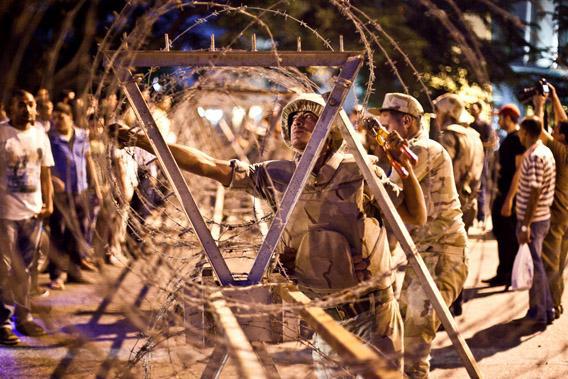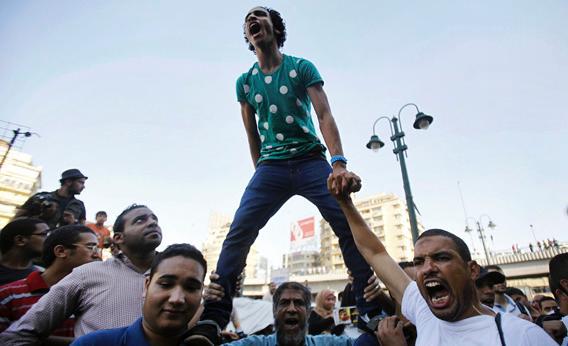On Sunday morning—the first day of the workweek in Egypt—Cairo seemed to be returning to some semblance of normalcy. Cars jammed the roads that connect the outer neighborhoods to the center of the capital, but evidence of the past week’s bloodbath, which has killed more than 1,000 people since the military government cracked down on Muslim Brotherhood supporters of ousted President Mohammed Morsi, was everywhere—burned out Central Security Forces vans and armored cash transport cars dotted the road from the airport. Smoke still rose from the Arab Contractor’s building close to Ramses Square, where a standoff between Morsi supporters and angry civilians and security services had come to a head two evenings before.
I had asked Michael, who I have worked with for years, to pick me up from the airport because of increasing attacks on Western journalists in Cairo. He took the scene in stride as we stalled and stopped in traffic, pointing out the remains of torched cars and anti-Brotherhood graffiti along our route. “Not all of us are shooting each other,” he told me when I asked if he was nervous about the situation. He was completely unfazed by the week’s carnage and said the Muslim Brotherhood had asked for it by continuing the sit-ins it had been holding since Morsi was removed in a coup on July 3. “They are terrorists,” he said, plain and simple.
Michael is a Coptic Christian. Copts make up roughly 10 percent of Egypt’s population of 85 million. While sporadic attacks on churches and Copts have become more frequent with the rise of political Islam, Michael has always claimed he wasn’t afraid of sectarian attacks. Nor did he seem to care if all the Brotherhood supporters were expunged from Egypt. “They are terrorists,” he repeated, even though just a month earlier they were politicians, representing Egypt after winning free and fair elections.
I wasn’t surprised to hear him defend the military’s bloodletting. In the past five years, the words “civil war” have never been closer to the tip of people’s tongues. There’s something deeply wrong here, and it isn’t just the scenes of urban battles and morgues—an unfortunately frequent sight in the Middle East. Today in Egypt, the sheer hatred and vilification of the other side has created two parallel worlds of victims.
Well-known liberal activists defend the slaughter of Brotherhood supporters, while groups of Islamists burn churches across the country in retribution for a coup engineered by the higher echelons of the military. Attacks on the foreign press, who are thought to be in cahoots with the Brotherhood, are rising. Groups of armed citizens have formed neighborhood patrols to defend their streets, picking fights with anyone they don’t take a liking to. The divide, fanned by state and private media, seems impossible to breech, while compassion from either side has long since faded—both sides claiming if you’re not with us, you’re against us.
“This is a time of insanity,” says Nadine Wahab, a human rights activist. “I’ve almost stopped engaging the political discourse, because every time I do, I get slammed down by someone. … If I mention the violence by the protesters, the Muslim Brotherhood, I’m told I’m supporting an authoritarian regime. If I mention violence by the state, I’m told I’m supporting the Muslim Brotherhood and their violence. So from this perspective it’s a lose-lose for me, but I do see it as a win-win because at some point one of them has to stop, there has to be this point where it’s too much and I’m hoping this happens before we turn into Syria.”
There was a segment of the population that always despised the Muslim Brotherhood. But the numbers demonizing the Brotherhood have quickly mushroomed, especially since the military ousted Morsi a month ago. In Wahab’s opinion, the battle lines were drawn last December when the Brotherhood encouraged its supporters to take the streets to defend the president and attacked a sit-in in front of the presidential palace. The crowds had been peacefully protesting Morsi’s seizure of unchecked power until a new constitution, hastily written by Islamists, was ratified.

Photo by Virginie Nguyen Hoang/AFP/Getty Images
Wahab says the general public realized the Brotherhood would send armed civilians to protect its political interests. At the time, she says, people thought: “They’re coming to kill us.” Six people were killed that night.
In the months since, sporadic armed clashes have continued, buttressed by further obstinacy from both sides in coming to a compromise over the country’s political turmoil. Many began to believe the Brotherhood would do whatever it took to maintain its grip on power—this has created an atmosphere of blind hatred.
“Perception is more important than facts right now,” she maintains. “It’s a very basic fear. People are not just afraid of going into the streets, they are literally afraid of being shot in their houses.” It’s a fear felt by just about everyone.
Wahab is one of the few people I know who seems to have compassion for both sides. But on the streets, the divide seems to be growing, fed by state media and private channels, which have targeted the foreign media, blaming them for sympathizing with the Brotherhood, ignoring Morsi’s abuses while in power, and failing to cover the Brotherhood camps alleged violence at the Rabaa al-Adawiya mosque and Nadha sit-ins. (The Brotherhood is accused of torturing and killing those the group detained over the course of their one-month sit-in.)
On Saturday, the Egyptian government issued a seven-point memo to foreign journalists chiding them for biased coverage “according to a certain political agenda … conveying a distorted image that is very much far from the facts and media coverage. This raises many questions about the neutrality of this media coverage and its goals.” The interim president and Gen. Abdel Fattah al-Sisi, the general in charge of the armed forces, echoed those claims on television. Violence against foreign reporters has only increased. Age-old conspiracy theories that the U.S. government is trying to destabilize Egypt, this time by supporting the Brotherhood, have taken on a renewed urgency.
Mahmoud Salem, a well-known Egyptian blogger who writes under the name Sandmonkey, denounced the uptick in xenophobia on Sunday: “You see, in order for the international media to showcase your side of the story, you actually have to have a side of the story. Your new state needs to have a solid case why it overthrew the old one, which, FYI, is not being made,” he wrote, urging the local media to do more to explain the Brotherhood’s abuses while in power and for Egyptians to stop threatening the foreign press on the streets. But it seems few people got his message—another report of journalists being detained by plain clothed officers surfaced yesterday.
Although the rallies are now smaller, the situation is by no means under control. The government acknowledged that security forces killed 36 Islamists in their custody Sunday night. Meanwhile, militants were reported to have killed at least 24 police officers in northern Sinai on Monday. The response from both sides seems mired in the pattern of blaming the other.
Back in the car, Michael and I had found common ground; we both agreed the January 2011 revolution had ended—the feeling of national euphoria and hope for a better, united Egypt was history. We also agreed the Islamists would never forget last week’s violence. “The revolution may be over, but the terrorism is starting,” he said.
